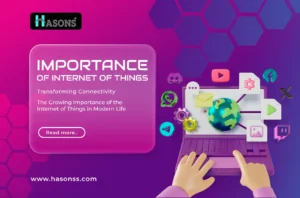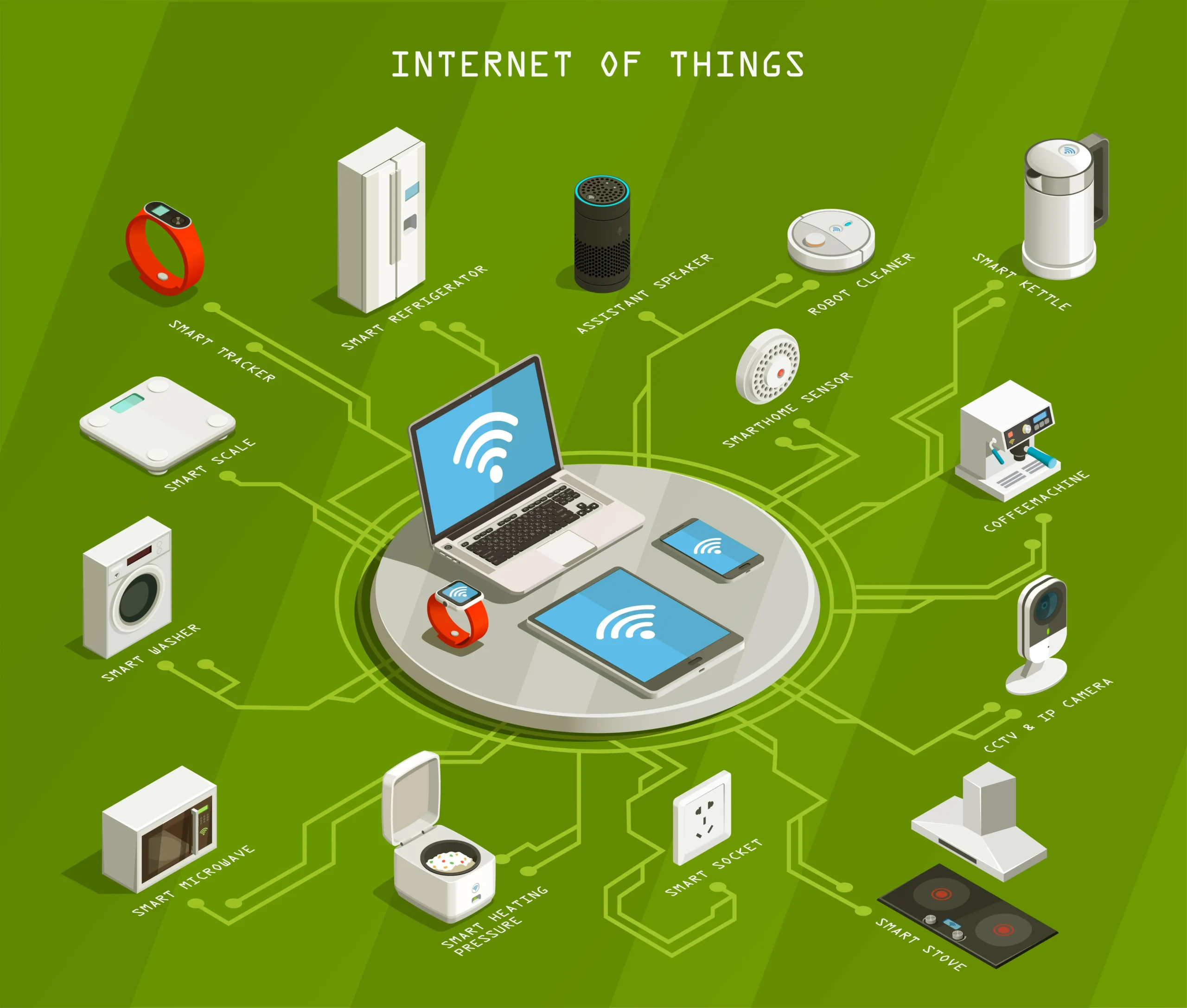Importance of Internet of Things (IoT)
The Importance of IoT is transforming the world as we know it. From smart homes to wearables, connected cars to industrial automation, IoT is enabling a level of connectivity and efficiency like never before. But what exactly is IoT, and why is it so important?
What is Internet of Things (IoT)?
The Internet of Things refers to the network of physical objects embedded with sensors, software, and connectivity that allows them to connect and exchange data with other devices and systems over the Internet. These “smart” devices range from simple sensors that track temperature or motion, to complex machines like self-driving cars or industrial robots.
At its core, IoT is about harnessing sensor data, machine learning and connectivity to gain operational efficiency, new insights and automated decision making. This allows us to track assets, optimize processes, reduce waste, and make faster and better decisions.
Importance of Internet of Things (IoT)
There are several key reasons why IoT is such an important technological revolution, Importance of IoT:

1. Improved Efficiency
IoT enables organizations to track assets, optimize systems and reduce waste through advanced data collection and analytics. Smart sensors can monitor production lines for failures, ensure machines receive preventative maintenance when needed, or adjust heating and lighting usage in offices based on occupancy. This leads to less downtime, higher employee productivity and significant cost savings.
Cisco estimates that IoT has a $4 trillion to $11 trillion per year potential economic impact through improved efficiencies over the next 10 years.
2. Better Insights
The data gathered by connected IoT devices provides insights that simply were not possible before. Real-time tracking of products, equipment and interactions allows businesses to analyzing performance, spot trends and make continuous improvements.
For example, health IoT devices can monitor patient vitals 24/7, allowing doctors to provide personalized care while avoiding the need for hospital visits. And smart meters enable utility companies to tweak pricing based on real-time demand.
3. Increased Automation
IoT automation refers to devices’ ability to take action without human intervention. Smart heating systems power down when rooms are unused; self-driving trucks deliver goods without a driver; and Alexa decides to order milk when your fridge runs low.
This automation allows businesses to reduce labor costs while accelerating decision velocity for optimized operations. As AI and machine learning mature, organizations will continue expanding their use of IoT automation.
4. Enhanced Customer Experiences
IoT also has powerful implications for understanding and connecting with customers. Retailers can now track real-world customer journeys through stores to optimize layouts. Utilities can rapidly detect outages through smart grid infrastructure. And product companies can analyze how customers are actually using devices to inform design improvements.
Even simple conveniences like remotely monitoring and brewing coffee from your smartphone demonstrate IoT’s potential to connect businesses to consumers in new ways.
5. Societal Benefits
IoT will bring broad societal benefits as well, enabling smarter cities with reduced traffic congestion, lower crime rates and more efficient delivery of public services. And applications in healthcare, fitness tracking, and food supply chain management have potential to significantly improve health and nutrition globally.
McKinsey estimates that IoT could generate up to $11.1 trillion per year of economic value for society as a whole by 2025.
In summary, the connected devices, constant data streams and automated capabilities made possible by IoT will lead to reduced costs, accelerated growth, new revenue opportunities and overall competitive advantage for businesses – while also improving experiences and quality of life for global consumers. The importance of IoT simply can’t be overstated.
Advantages of Internet of Things (IoT).
There are many clear advantages to implementing Internet of Things solutions across both industrial and consumer scenarios:

– Operational Efficiencies
- Reduced costs through optimized assets, processes and labor
- Improved productivity and asset utilization
- Increased employee productivity
- Enhanced return on assets
– Revenue Opportunities
- Development of new IoT-enabled products and services
- Ability to charge for usage-based services
- Ongoing revenue streams via subscriptions and data monetization
– Data-Driven Insights
- Real-time monitoring provides valuable data insights
- Spot trends, patterns and opportunities through data analytics
- Enable fact based and data driven decision making
– Enhanced Customer Experiences
- Personalized and contextually-relevant engagements
- Frictionless experiences with predictive actions
- Connected device integration provides convenience
– Competitive Differentiation
- Innovate ahead of competition with IoT capabilities
- Entirely new competitive front opens vs companies lacking IoT integration
- First mover advantage in IoT-driven segments
In essence, IoT allows organizations to increase efficiency, harness insights, accelerate innovation cycles and gain competitive advantages across every aspect of their business.
Benefits of IoT
Beyond the overarching advantages, there are a number of specific benefits that IoT brings across industries:
Manufacturing
- Preventive equipment maintenance to reduce downtime
- Asset tracking to optimize inventory usage
- Quality control automation via smart sensors
- Supply chain integration for tracking and logistics
Transportation
- Fleet tracking for efficient routing and asset utilization
- Connected vehicles to reduce fuel costs and predict maintenance needs
- Smart tolling systems to reduce traffic at peak times
- Smart parking solutions help drivers save time and money
Utilities
- Automated meter reading for real-time usage tracking
- Detect issues like leaks/outages instantly with smart grid
- Dynamic pricing and consumption based on demand signals
- Infrastructure monitoring from remote locations
Healthcare
- Remote patient monitoring for improved outcomes
- Connected medication dispensers and medical devices
- Asset tracking for increased hospital efficiency
- Biosensors to enable analytics and predictive diagnostics
Retail
- Proximity apps to engage consumers in store
- Smart shelves to enable precise inventory management
- Digital signage tailored to specific customers
- Predictive analytics to optimize staffing and merchandizing
Essentially all industries stand to benefit from IoT – with manufacturers, energy firms, healthcare providers and retailers leading the way in adoption. But applications span smart buildings, smart cities, autonomous vehicles, wearables, augmented reality, agriculture, and a near endless array of additional use cases. IoT potential is limitless.
Conclusion
In summary, the Importance of IoT, Internet of Things is transforming businesses and driving the next industrial revolution. By instrumenting the physical world with smart sensors and actuators, IoT enables organizations to monitor, optimize and automate processes across every industry.
Providing unprecedented data visibility and asset connectivity, IoT becomes the critical foundation for creating smart infrastructure, driving operational efficiencies, generating innovative products and services, enabling profitable growth and exceeding customer expectations.
While IoT adoption is still in the early stages for many companies, leading organizations are already outpacing the competition with IoT-driven insights, innovations and automation capabilities. Internet of Things importance will only continue to accelerate in the years ahead as the supporting technologies mature, costs decline and new applications emerge. There has never been a more exciting time to harness connected devices and data to transform your business.
Now, understanding this concept is simple and entertaining on Hasons. By using Hasons website you can always stay one step ahead in your job, business or studies by purchasing New Age Desktops and All in One Desktops, i3 Intel Core Processor Desktop starting from 15000/-. Monitors, CPUs, Gaming Desktop are also available. Register on Hasons and order your Tech Partner Now. Get exciting offers and benefits on your every purchase. Contact us so our support team will guide you in purchasing your right Tech Partner.
 I3 processor 8GB RAM 4th gen/500 GB HDD/ 128 SSD Wired Keyboard and Mouse/ Windows 10/Black, screen 18.5
I3 processor 8GB RAM 4th gen/500 GB HDD/ 128 SSD Wired Keyboard and Mouse/ Windows 10/Black, screen 18.5
Call 9766122859 to place an offline order and receive FLAT 500/- DISCOUNT
Importance of IoT
- What is the importance of IoT networks?IoT networks create connections between physical assets by combining smart sensors, connectivity, data and analytics. This enables organizations to precisely track items, monitor processes, optimize performance, reduce waste, automate tasks and improve overall efficiency at scale. IoT networks lay the foundation for smart, data-driven operations.
- Why is IoT important to society?IoT brings broad societal benefits like smarter cities, enhanced public safety & security, reduced traffic congestion, improved healthcare and nutrition globally. IoT could generate over $11 trillion per year of economic value for society by 2025 according to McKinsey.
- What is the importance of IoT projects?For businesses, launching IoT pilots and projects allows them to demonstrate ROI, build internal capabilities and momentum before committing to full scale implementations. Successful IoT projects exponentiate a company’s digital transformation.
- What is the importance of IoT in industries?IoT brings game-changing opportunities to advance operations across sectors like manufacturing, transportation, utilities, healthcare and retail. Key benefits include improved efficiency, insights, automation and customer experiences – leading to cost savings plus new revenue opportunities per industry.
- What is the importance of IoT Quora?Platforms like Quora allow experts to share the business and economic importance of emerging technologies like IoT. This raises awareness for technological advancement and provides opportunities to educate on topics that will impact operations across every industry in the years ahead.
